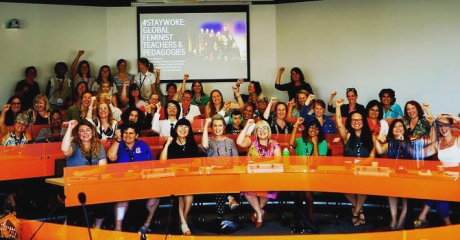'Post-truth Populism and Pedagogies: Challenges and Strategies in a Shifting Political Landscape'
This conference which took place at the University of Newcastle, Australia in December 2018 was themed around working within a broader complex political environment, raising questions of how we as educators can respond to current challenges through our pedagogical practices. Professor Penny Burke introduced the conference, echoing the concerns of many that it is becoming increasingly acceptable to be openly misogynistic, racist, homophobic and transphobic and to target the most vulnerable members of society such as asylum seekers. Burke contended that at this time it is increasingly urgent to find a way to reimagine feminist scholarship, activism and pedagogies. The conference was an opportunity for me to share some of the conversations on a similar theme which have been taking place with colleagues from the Centre for Gender Studies and more widely at the university. Following the pro-Brexit vote in 2016 staff from LPS and the Centre for Gender Studies met to discuss our responses. Following this we set up a working group to discuss the implications of a turbulent political 'post truth' landscape for our pedagogical practices. From here, the working group (supported by LPS) convened a number of seminars on themes such as developing safer teaching spaces, linking with the wider community, decolonizing the curriculum and tackling misconceptions about Islam in the HE classroom. This culminated in university wide workshop supported by the Centre for Gender Studies, Centre for Higher Education and Equity Research and ADQE on the topic of 'Teaching in Turbulent Times' in September 2017. A reading group on the theme of 'liberatory pedagogies' continues to explore pertinent themes, linking key critical texts with everyday classroom experiences, alongside a blog https://teachinginturbulenttimes.wordpress.com/
In short, we have been developing a 'community of practice' at the university and the conference theme fitted perfectly as a way to share this work alongside my reflections on my own teaching practice in a paper entitled ‘Working with discomfort: reciprocity, recognition and reflexivity in feminist teaching’ which was well received and stimulated some lively discussion, particularly about ways of responding to racism, xenophobia and sexism in the classroom in a context where universities are often under fire in the media for being overly ‘PC’ or left-wing. I was generously supported in attending by the Centre for Gender Studies, LPS impact funds and staff development funds via the School of Education and Social Work.
Highlights included the first keynote by Professor Sondra Hale from the University of California, ‘Something Resembling “Truth”: Reflections on Critical Pedagogy in the New 'Post-Truth' Landscape’ which raised many questions about what truth is and how we as academics and teachers can respond. Of particular interest was the suggestion that such questioning of truth could potentially play into democratizing and decolonial agendas which critique narrow, western-centric conceptions of knowledge. Emphasising that the current questioning around truth can stimulate valuable conversations with our students, Hale advocated engaging with ongoing epistemological questions and as critical educators continuing to challenge notions of abstract, neutral, value-free processes in knowledge. Raewyn Connell’s keynote 'Truth, Power & Pedagogy' interrogated gendered power relations on the global stage while drawing attention to the imperial history of knowledge about gender. Connell outlined ways in which ‘telling lies’ has always been part of politics, particularly in terms of colonisation, indicating that lies most often stem from the holders of power. Echoing Hale, she ascertained that what we cannot risk is reverting to universalism and essentialism; criticality is integral to intellectual culture and key to building – not just reproducing – knowledge. Moving away then from a concept of truth as ‘fixed’, we can still work towards truthful practices of knowledge and research; making our work relevant to real-world problems, including multiple viewpoints, engaging in collective processes, integrating emotion and reason and maintaining our commitment to pedagogies which go beyond a simple transfer of knowledge.
One of my personal favourite aspects of the conference was taking part in the first feminist teachers’ symposium, ‘#Staywoke: Global feminist teachers and pedagogies’ convened by feminist teacher, Alice Ewell from Brisbane, Australia and US-based feminist teacher and scholar, Ileana Jiménez. This explored the challenges and successes of doing intersectional feminist work in schools and universities in Australia and globally alongside ways for feminist teachers and scholars to share their work and collaborate in innovative ways. Within the individualising structures of the contemporary academy, it can be isolating and difficult to sustain engagement in feminist practices and collective efforts. The symposium stressed the importance of creating spaces for dialogue and support for our efforts in navigating challenging educational and political challenging terrain. We were challenged to think deeply about what it means to be a feminist teacher and Ileana Jiménez reminded us that teaching is personal – we are not empty vessels but bring our identities, stories and backgrounds to our teaching. Feminist pedagogy entails involves thinking reflexively about who is in the classroom, what we bring to the classroom and how we bring in our embodied lives – working in the long-term towards justice and emancipation for our students and also ourselves. Ileana suggested it is less about ‘good practices’ in a narrow sense and more about challenging ourselves to live the life of a feminist pedagogue and practitioner from day to day. These insights and the opportunity to hear from and meet feminist educators from around the world felt very personally supportive and validating. Of course there were many inspiring talks, conversations and symposia throughout the conference and more details can be found on the conference website: https://www.geaconf2018.com.au/QuickEventWebsitePortal/geaconf2018/eventinfo
Overall I felt very grateful and honoured to take part – it was a huge privilege to take part in such important conversations and develop sustaining connections. Thanks are due to the Centre for Gender Studies for enabling me to attend.

